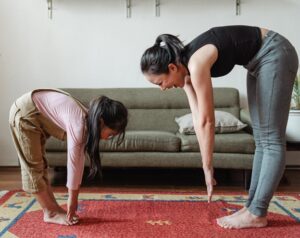
Ways to Improve Your Sleep
- Establish a good environment
To reap the skin benefits from sleep, you should get at least seven to nine hours of shuteye every night. Establishing a sleep-promoting environment will help you sleep longer.
Make your room a haven for sleep by removing distracting electronics, using blackout shades to drown out light and noise, and decorating your room with soothing, serene decor. Inject some positivity into your home and reduce feelings of anxiety by decluttering and tossing out items that no longer work or that you no longer use.
- Exercise
A regular fitness routine has many benefits, including promoting good sleep. Staying physically fit can increase sleep quality and reduce the amount of time it takes to fall asleep. Moderately exercising 30 minutes a day can do wonders for your sleeping issues.
- Set a schedule
Give yourself a regular bedtime schedule throughout the week, and don’t deviate from it. You can have some flexibility on weekends but getting enough sleep during the week can make a huge difference.
- Treat overbite if necessary
If you have a deep overbite, this can affect your breathing while you sleep and cause obstructive sleep apnea. While less severe cases of overbite are typically only a cosmetic concern, a serious issue will need to be corrected. Overbite treatments include in-office or at-home aligners, braces, and correction surgery, which is pricey and may include several months of recovery. Before choosing the best option for you, make an appointment with an orthodontist.
Ways Sleep Can Improve Your Skin
- Sleep rejuvenates your skin
Experts realize that sleep is a crucial part of helping skin stay beautiful by preventing aging and allowing your skin to rejuvenate. Your growth hormones play a huge part in the aging process; if you get enough sleep, they work to repair damaged cells.
- Sleep and hydration work together
When you’re well-hydrated, you sleep better. Drink plenty of water throughout the day to help your skin maintain its elasticity. Don’t drink too much in the hours before bed, though. A good skin moisturizer can go a long way as well. When you wind down for the night, wash your face and put on some moisturizer that can help your skin repair overnight.
- Sleeping away from light sources can boost skin health
From a scientific perspective, even small amounts of UV radiation can damage cells and increase skin cancer risk. If possible, move your bed away from the window. The less sun you have on your face, the better.
- Your exercise routine is more effective
Sleeping well can make your workouts more effective. Exercise can help you reduce stress, which will help you sleep better and improve your skin. When you exercise on a regular basis, you’re able to experience these benefits more easily. Exercise also helps your skin by increasing blood flow and nourishing the skin cells. It’s just as important to shower after a strenuous workout. One tip from the Mayo Clinic to keep skin hydrated is to moisturize directly after showering, especially if you live in a dry area.
- You’ll manage stress better
Stress can trigger an inflammatory response throughout the body, which can lead to breakouts or aggravate pre-existing skin conditions. There’s a cyclical relationship between sleep and stress. When you reduce stress in your life, you sleep better; and you might notice that on days you slept well, you handled stressful events a lot more easily. You have patience for some of the more difficult issues you typically face. This, in turn, helps you sleep better.
- Sleep boosts the immune system
It’s been scientifically shown that microbes on our skin specialize in protecting us from invading organisms, providing nourishment, and existing in a beneficial symbiotic relationship. When you sleep well, your immune system has time to heal your body, including your skin. Your skin does a great job of warding off disease and illness. Getting enough sleep is a simple method for helping your body maintain its peak health.
- No matter your genetics, sleep still makes a difference
It’s true that genetics can influence skin health, but the activities we engage in can determine which genes are expressed or turned over at different points in life. Having good sleeping habits can make a big difference.
Many people simply want to look younger and are trying to identify a good skin care routine that supports looking younger. Sleep is an important part of that routine, as is regular exercise, a healthy diet, and stress management. Start with having a healthy sleep routine and build habits around it. Doing so will help your skin stay healthy.
Photo credit: Pexels
